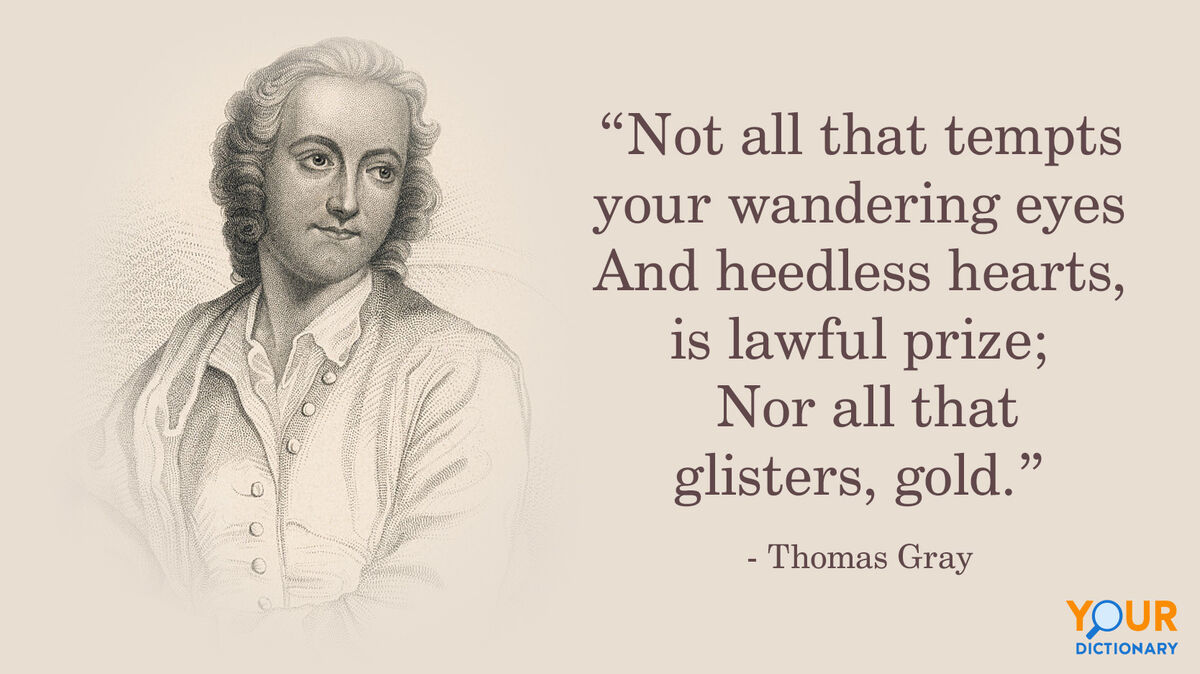
Although Thomas Gray was not the prolific poet of his time, he was one of the most celebrated and influential. From death and mortality to love and beauty, Thomas Gray captured the splendor of human life with his timeless words.
Quotes From Thomas Gray Poems
Thomas Gray published only 13 poems in his lifetime, but each of them is a classic. Perhaps his best-known poem is “Elegy Written in a Country Churchyard,” which was inspired by Gray’s mourning of his friend Richard West. The themes of death and mortality were prevalent throughout his poems and would follow him until he went to his own grave.
“Can honour's voice provoke the silent dust, or flattery soothe the dull, cold ear of death?” - “Elegy Written in a Country Churchyard”
“The paths of glory lead but to the grave." - “Elegy Written in a Country Churchyard"
“But Knowledge to their eyes her ample page, /Rich with the spoils of time, did ne'er unroll.” - “Elegy Written in a Country Churchyard"
“Far from the madding crowd's ignoble strife/ Their sober wishes never learn'd to stray;/ Along the cool sequester'd vale of life/ They kept the noiseless tenour of their way.” - “Elegy Written in a Country Churchyard"
“T'was Spring, t'was Summer, all was gay/ Now Autumn bears a cloud brow/ The flowers of Spring are swept way/ And Summer fruits desert the bough” - “Autumn”
“Daughter of Jove, relentless power,/ Thou tamer of the human breast,/ Whose iron scourge and torturing hour/ The bad affright, afflict the best!” - “Ode to Adversity”
“What sorrow was, thou bad'st her know,/ And from her own she learned to melt at others' woe.” - “Ode to Adversity”
“Now my weary lips I close;/ Leave me, leave me to repose!” - “Descent of Odin”
“Iron sleet of arrowy shower/ Hurtles in the darkened air.” - “The Fatal Sisters”
“Too poor for a bribe, and too proud to importune,/ He had not the method of making a fortune.” - “On His Own Character”
“While bright-eyed Science watches round.” - “Ode for Music”
“Sweet is the breath of vernal shower,/ The bee's collected treasures sweet,/ Sweet music's melting fall, but sweeter yet/ The still small voice of gratitude.” - “Ode for Music”
“And weep the more, because I weep in vain.” - “Sonnet, On the Death of Mr. West”
“The social smile, the sympathetic tear.” - “The Alliance of Education and Government”
“When love could teach a monarch to be wise,/ And gospel-light first dawn'd from Bullen's eyes.” - “The Alliance of Education and Government”
“Thoughts that breathe, and words that burn” - ”The Progress of Poesy: A Pindaric Ode”
“Ah, happy hills! ah, pleasing shade!/ Ah, fields beloved in vain!/ Where once my careless childhood stray'd,/ A stranger yet to pain!/ I feel the gales that from ye blow/ A momentary bliss bestow.” - "Ode on a Distant Prospect of Eton College"
“Thought would destroy their paradise.” - “Ode on a Distant Prospect of Eton College”
“Where ignorance is bliss, 'Tis folly to be wise.” - "Ode on a Distant Prospect of Eton College"
“Not all that tempts your wandering eyes/ And heedless hearts, is lawful prize;/ Nor all that glisters, gold.” - "Ode on the Death of a Favorite Cat Drowned in a Tub of Goldfishes"
“Dear, as the light that visits these sad eyes;/ Dear, as the ruddy drops that warm my heart.” - “The Bard: A Pindaric Ode”
Thomas Gray Quotes From His Letters
While Gray was very self-conscious about his poetry, he frequently corresponded with friends and other writers through letters about his poems and a wide range of other topics.
“I shall be but a shrimp of an author.” - letter to Horace Walpole
“A life outside of the world has its hours of despondence, its inconveniences, its sufferings, as numerous and as real (though not quite of the same sort) as a life spent in the midst of it.” - letter to Mason (Jan. 3, 1758)
“Do I talk nonsense, or do you understand me? I am persuaded what I say is true in my head, whatever it may be in prose, – for I do not pretend to write prose.” - letter to Mason (Jan. 13, 1758)
The Lives of Romantic Poets
Though he only wrote 13 poems, Thomas Gray was a major inspiration for the Romantic poets of the 19th century. One of his contemporaries, Samuel Johnson, said of Gray, “Gray thought his language more poetical as it was more remote from common use.”